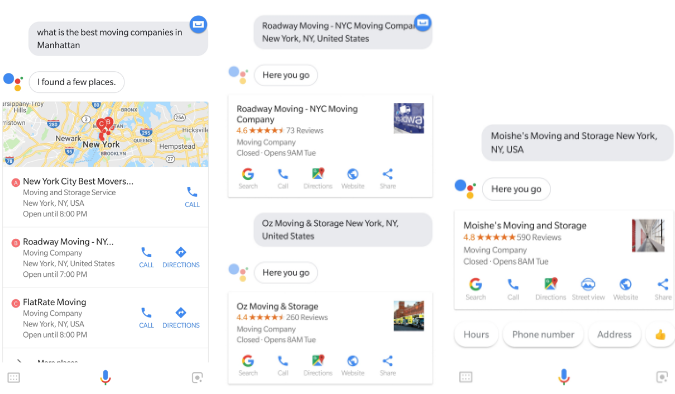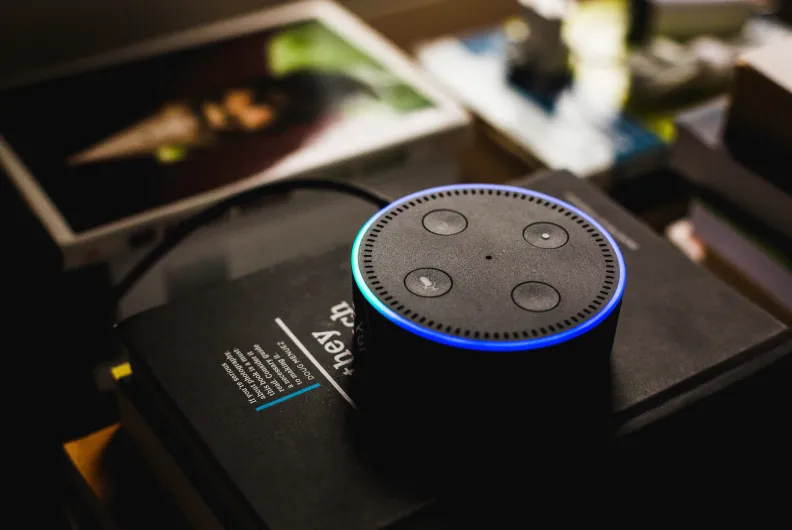Local SEO for Voice Search
Voice Search isn’t a Fad
Voice search are two words that are starting to redefine the realm of search as we know it. It is a technology that is advancing fast towards the future. According to a report by Skyword (reported by Technavio), the voice recognition market will be worth $601 million by the end of 2019. Consumers are quickly adopting voice search to find information online using their mobile devices and now voice assistants. Alpine.ai estimates that there over one billion voice searches conducted per month and over one billion voice assistants will be enabled on devices in circulation by the end of 2018!
Sure, but how is this going to affect businesses & organizations?
Well, that is a great question and that’s exactly what we’re going to be discussing in this article. As it goes, voice-activated search is becoming very popular among consumers over searches that are typed out to access information. This is owing to the convenience and ease that comes with conducting voice searches. Generally we can type out only about 40 words per minute, but we can input 150 words per minute when we speak. That might seem like a basic fact, but the truth is, it is a significant fact that is fueling voice search as an industry. What’s more, people are using their voice-activated devices to look for business information. According to Think With Google, people who own voice-activated speakers are expecting business owners to improve business information provided for voice searches:
52% of these users want more information on offers, deals, sales, etc. 39% want business information regarding store location, business hours, contact information, etc. 38% of these people want to be able to access customer service and support.. 42% want to be able to find information about events and activities with regard to businesses.
How to do Local SEO — for Voice
Voice search is progressing tremendously, and the onus of providing business information optimized for voice searches is the responsibility of businesses and organizations. Here’s how you can optimize your local SEO to appear on voice searches.
Strengthen Your Online Presence with Business Listings
The first thing you need to do in order to appear on voice searches is to make sure that your business information is listed online. This is a simple process that helps you create an online presence for your business. These listings mostly go on sites like Google, Yelp, Yellow Pages, Yahoo, Bing, Facebook, etc. You need to make sure that you add the following information:
- Name, address and phone number (NAP)
- Website and contact details like email address
- Business, or organization categories
- Hours of operation
- Images and videos of your business’ location
- Location accessibility details like handicap-friendly facilities, pet-friendly facilities, parking facilities, etc.
- The products and services you offer
- Information about your business or organization
The key is to make sure that this business information is consistent and accurate across all your listing sites — especially the . When creating your listing(s), you can either do it manually or you can automate the process. Whether you’re doing it manually, a good tip is to use a spreadsheet to manage the directories that are important, and the information that needs to go in each. Once you’re done, you can start visiting the directories, listings sites and social media sites one at a time, creating profiles and adding organization information. For multiple locations, automating this process will be far more efficient. There are many different software solutions to help manage this process, such as local marketing software by Synup.
Improve Your Business’ Star Rating
Improving your star rating can increase the chances of helping your business rank higher on voice search. For example, if you were to run a search on ‘moving companies in New York City’, you’ll find that the businesses that appear on your result have a star rating between 4.4 to 4.8 points, such as these results:  To improve your star rating, you need to make sure that your organization is generating and monitoring reviews. According to a study reported by Search Engine Land, 72% of customers are more likely to trust a local business if it has positive reviews. The more positive reviews a local business has, the better their star rating. As customers are more likely to receive search results of businesses with a great star rating on voice searches, you need to make sure that your business is monitoring and managing reviews. Here’s some handy tips for review management.
To improve your star rating, you need to make sure that your organization is generating and monitoring reviews. According to a study reported by Search Engine Land, 72% of customers are more likely to trust a local business if it has positive reviews. The more positive reviews a local business has, the better their star rating. As customers are more likely to receive search results of businesses with a great star rating on voice searches, you need to make sure that your business is monitoring and managing reviews. Here’s some handy tips for review management.
- Collect your customers’ contact information and reach out to them to leave you reviews.
- Incentivize your customers to leave you reviews. You can give them a 10% discount on their next purchase in your store.
- Ask your customers to check-in with you on social media like Instagram and Facebook.
- Most importantly respond to both negative and positive reviews on your listings sites.
- Make sure you respond within 24 hours of the review being posted.
By doing this, you are bound to increase your star rating which will give you a better chance at ranking for voice searches.
Pro-tip: Make sure you concentrate your efforts on building Google Reviews. Google is a largely used search engine, which is where you can get the most traction out of voice search.
Leverage Featured Snippets
 Featured snippets are blocks of information that are presented to stand out from your usual search results. Take a look at this featured snippet. Featured snippets are mostly summaries of the long form content that appears online, and in this case it is a video. Featured snippets are more likely to be clicked on, and as a matter of fact, SEOs call this ‘position zero’ on the search engine results page (SERPs). And it is important to note that featured snippet works best for longform content like blog articles. Here are some pointers about how you can optimize your business information or website content to appear on SERPs. Try to write your content in list formats. Most featured snippets appear with content in bullet points. Make sure the headings on your list are marked with an H1 tag and include H2 or H3 tags. Make sure that your target keyword appears in the title tag, the meta description, and the URL of your page. Optimize your content for long tail keywords.
Featured snippets are blocks of information that are presented to stand out from your usual search results. Take a look at this featured snippet. Featured snippets are mostly summaries of the long form content that appears online, and in this case it is a video. Featured snippets are more likely to be clicked on, and as a matter of fact, SEOs call this ‘position zero’ on the search engine results page (SERPs). And it is important to note that featured snippet works best for longform content like blog articles. Here are some pointers about how you can optimize your business information or website content to appear on SERPs. Try to write your content in list formats. Most featured snippets appear with content in bullet points. Make sure the headings on your list are marked with an H1 tag and include H2 or H3 tags. Make sure that your target keyword appears in the title tag, the meta description, and the URL of your page. Optimize your content for long tail keywords.
Capitalize on Long Tail Keywords
As we’ve already read in the beginning of the post, conducting voice search is simple and convenient. The core nature of voice search — speech — differs from search that is typed out, so you’ll need to adjust your keyword strategy for voice search. You need to start targeting longtail keywords. The most important thing to keep in mind while doing a keyword research for voice search is to pick phrases and keywords that are conversational. Additionally, you have to consider semantics, and how voice queries are phrased.  Image Credits: Linkdex (https://www.linkdex.com/en-gb/)
Image Credits: Linkdex (https://www.linkdex.com/en-gb/)
- When you’re looking for keywords, make sure you keep in mind the semantics involved with voice search queries. For example, the query - ‘How to remove a curry stain’ can also be phrased as ‘How do I get rid of a curry stain’.
- Another thing to keep in mind while conducting keyword research is that people are mostly asking questions in their queries. So, make sure that you add interrogative words to your keyword structure like ‘what is’, ‘how to’, ‘when do I’, etc.
- Optimize for ‘Near Me’ searches.
Optimize Your Google My Business Page
To add the icing on the cake, your local SEO is prepared for voice search when your listings are completely informative. Google My Business needs a special mention as it holds the mother lode of ranking opportunities. When your business, or organizaton information is updated completely it is more likely that it will rank on searches. Make full use of the features that Google rolled out for GMB over the past year, such as Google Posts, and taking advantage of the new Service Menu, Google Q&A and more.
In Conclusion
Voice search is the future of search. It is progressing fast and will shape how consumers in B2B, and B2C will look for information as part of their evaluation and purchasing journey. Contact us today if you'd like to talk to one of SEO specialists.
Main photo: Andres Urena on Unsplash
Guest authour: Suzana Joel is a content marketer/writer at Synup who is currently scaling the Local SEO summit. When she's AFK (away-from-keyboard), she's sipping on some masala chai and reading a good book.



